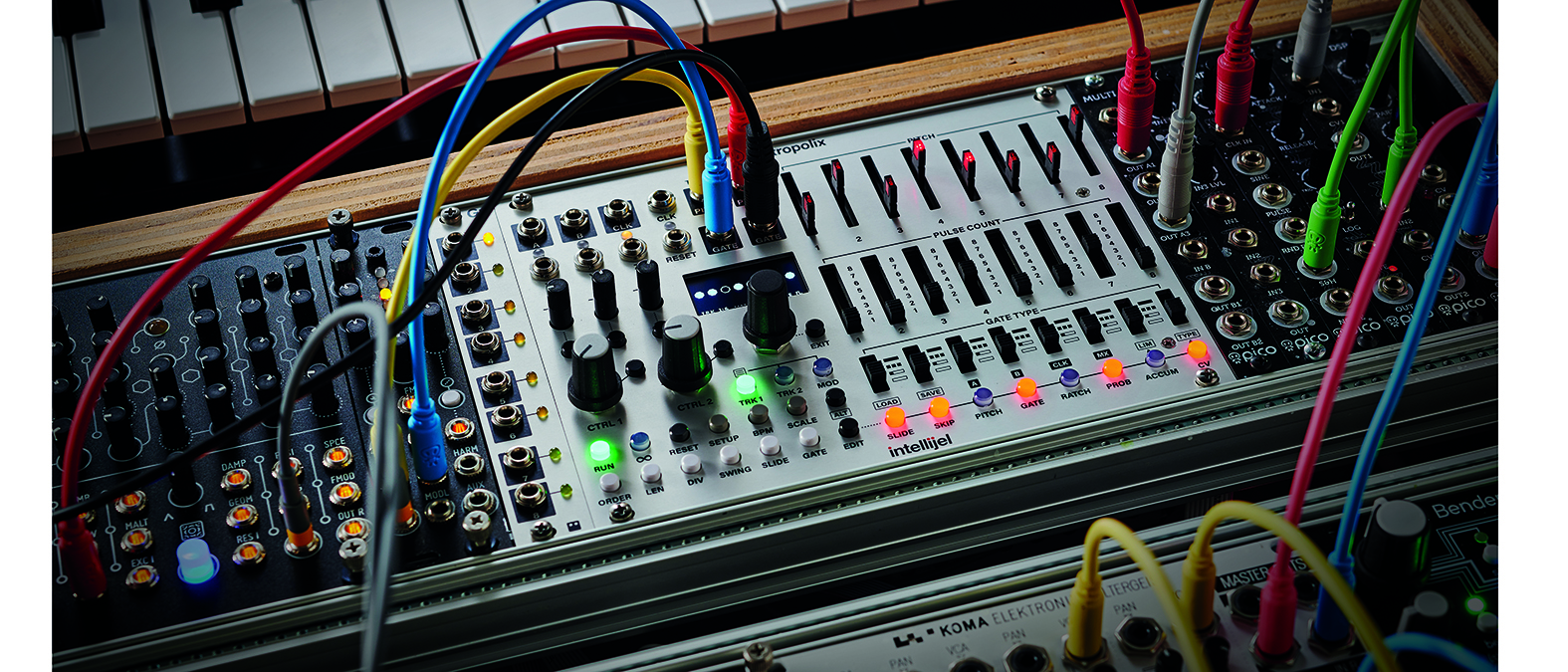MusicRadar Verdict
Metropolix takes an already excellent idea and expands upon it in many ways, increasing the abilities and fun factor dramatically.
Pros
- +
Complex results form an intuitive interface.
- +
Solidly built with clear labelling.
- +
Excellent screen and info design.
Cons
- -
Fairly expensive.
- -
Inevitable link between tracks due to workflow.
- -
MusicRadar's got your back
Intellijel Metropolix: What is it?
Intellijel’s Metropolix is billed as an interactive sequencer for live performance, jamming and improvisation and it has to be said from the off, it succeeds in all of these areas. If you’re familiar with the original Metropolis a lot will be familiar, but don’t be fooled into thinking this is a minor update. Metropolix has an abundance of new features that lift it far above what came before.
Metropolix is a 34hp module which sounds like a lot of valuable room to occupy but it absolutely pays its way. Every control feels responsive, with excellent levels of friction to help dial in exactly what you want. I/O remains similar, with pitch, gate and clock outputs, alongside an A and B for two additional controls and there is a clock in and reset, next to three CV ins for assignable control. More on this later.
The new screen is the most obvious change physically and it is a joy to behold. It is bright and clear and the interface has clearly been thoughtfully designed. Often there are two levels of attributes that can be adjusted and a click of a button lets you swap between them. When setting scales and notes, there is a keyboard representation which really helps nail melodic choices on the fly.
Similarly, when adjusting the per stage elements of things like the ratchets or slides, the display shows an at-a-glance status for the levels of each stage. Everything about the visual feedback is thoughtful and easy to read, even the tiny lock or browse icons to show the status of what you are navigating.
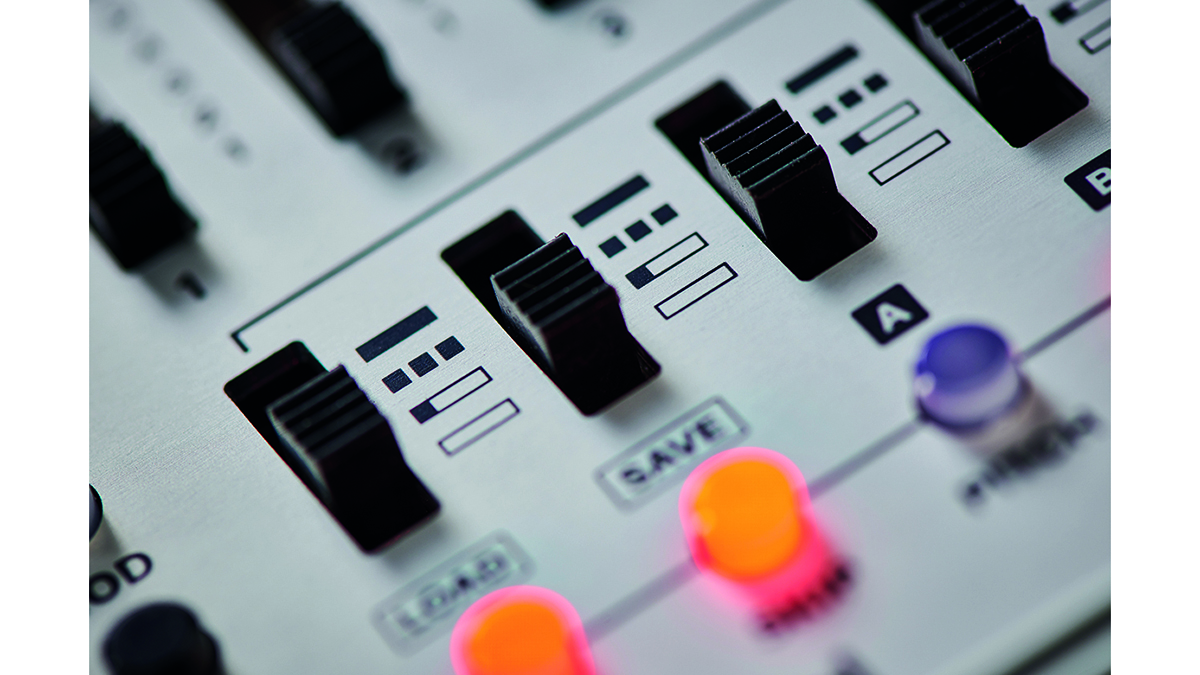
Intellijel Metropolix: Performance and verdict
Just like the previous version, the eight stages are split into three main controls; pitch, pulse and gate type, making for a very live jam friendly workflow. The pitch sliders can be forced to an octave range and you aren’t constrained to eight stages either. In fact you can actually split the stages into two blocks of four, using half for each track.
Which leads on to one of the big additions. Metropolix doesn’t just have a single sequence anymore but three. Two melodic tracks, with all the same functionality and one mod track which is in reality eight mod tracks, assignable to either or both of the melodic tracks, and can modulate an extensive list of parameters.
Obvious choices are play direction, octave range and gate length. Why would you want a gate length mod, when there is a global gate length control? Well, the mod tracks are per stage (but not pulse) meaning individual stages can be modified. That’s a basic example but when you start to experiment with these and the mod lanes (which are different again) you soon realise the possibilities are boundless.
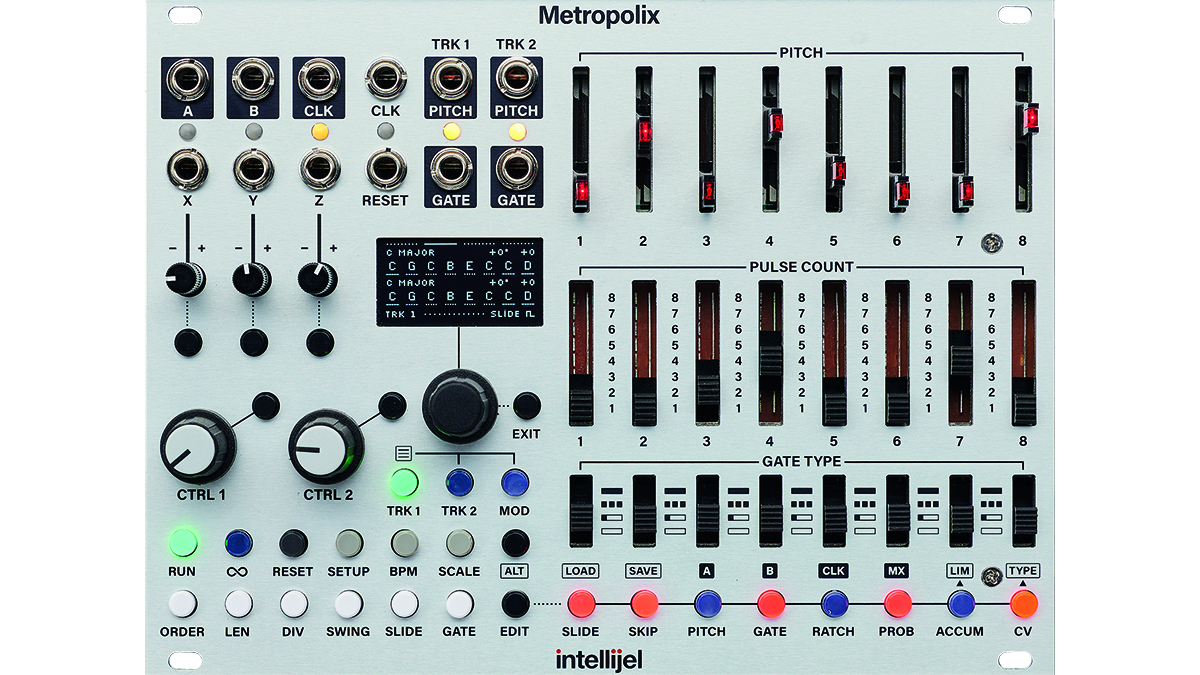
Mod lanes you say? Yes. One of the big additions to Metropolix is the mod lanes, accessed by hitting the edit button and choosing a lane, from skip to cv. These are, again, stage-based and this is where the most immediate payoff resides when jamming with the Metropolix.
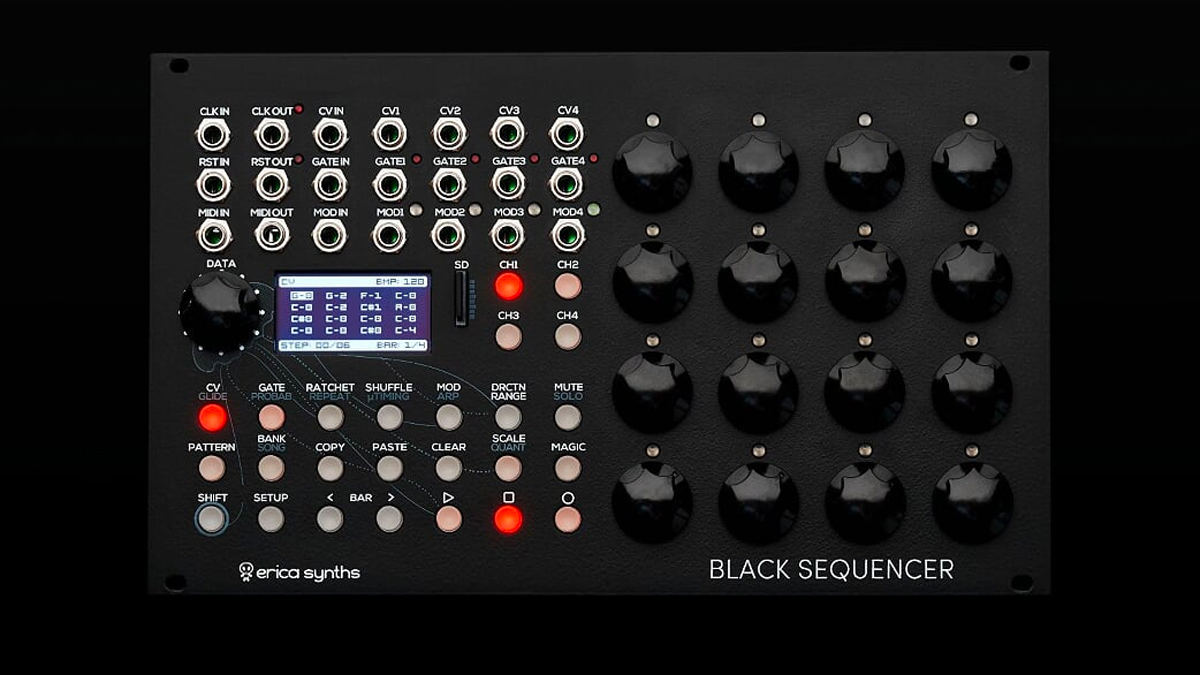
• Erica Synths Black Sequencer
A four track sequencer, which, although more linear in workflow, does offer some excellent modulation options.
• Make Noise René 2
Another great and original sequencer, with the obligatory Make Noise styling and touch interface.
As an example… Say all the pitch sliders are set the same, with a four-stage sequence that has equal gate lengths and each has a single pulse. Hit the edit button followed by the accumulator button and you are in accumulator mode. The display shows the eight stages, each selectable by hitting the corresponding lane button, which will illuminate.
Twisting the main encoder changes the value, plus or minus, to the desired level, graphically represented. The accumulator adds to the pitch by the degrees set, sticking to the chosen scale. Each time the sequence runs, the note bumps up by the same amount until it wraps back around. With all the sliders at zero you can still get a melodically interesting and musical result, perfect for generative music.
This accumulation of pitch can be affected by mod tracks too, with options for you to change direction or action, like getting to the limit of the octave range and scale settings and holding, wrapping back to the start or reversing.
Other mod lanes are equally as intuitive and useful. These include the more traditional slide, skip and ratchet, as well as the less seen pitch, probability and cv. If the mod is an on/off type slide, then the display shows a simple row of rings, or crosses, to denote the status. Ratchets show eight columns of blocks, where each block represents a repeat. All very visible on the fly, for an exceptionally speed of thought creation process.
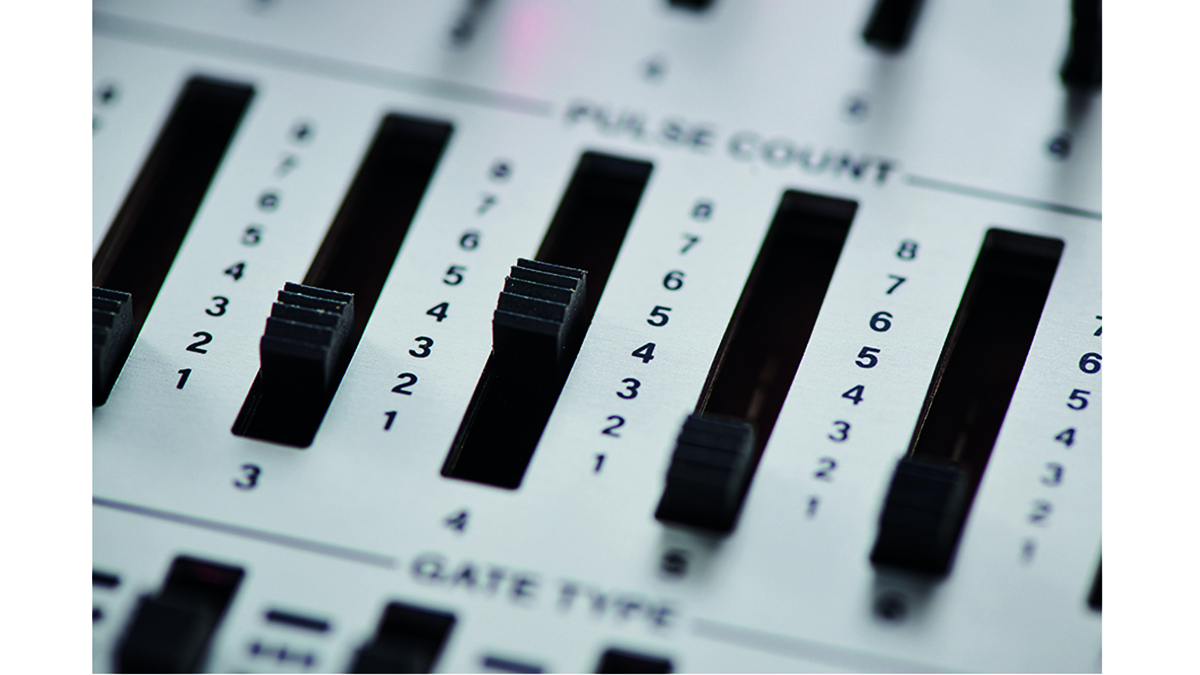
And there's more
While all these features make for a solid feature set there is far more that Metropolix has up its sleeves.
The two control knobs are assignable to a range of parameters, as are the three CV inputs above. The associated knobs here are normalled as well, giving access to additional levels of control, without having to externally patch them. As with the two control knobs there is a good range of parameter assignment available for these and all of the above can be configured to work across one or each of the tracks.
There’s an awful lot going on… but it never feels like menu-diving
The grid of buttons to the bottom left is where the more standard controls are to be found, from global settings, clock division, speed and scale. A click of any of these will bring up the associated options on the screen. There is an awful lot going on here, with multiple menus and this is compounded by the fact that many settings can be configured to one or more of the tracks. That said, it never feels like menu diving. The graphics are crisp and clear, the way information is navigated and presented is logical and, more importantly, consistent to its type, making the learning curve for Metropolix a shallow one.
Considering the nature of the module, it would be a good idea to pair it with the optional gate expander, for tighter integration with your rig, where you can take a gate from each stage to send elsewhere – possibilities abound, from triggering drums or playing a sample that is perfectly timed.
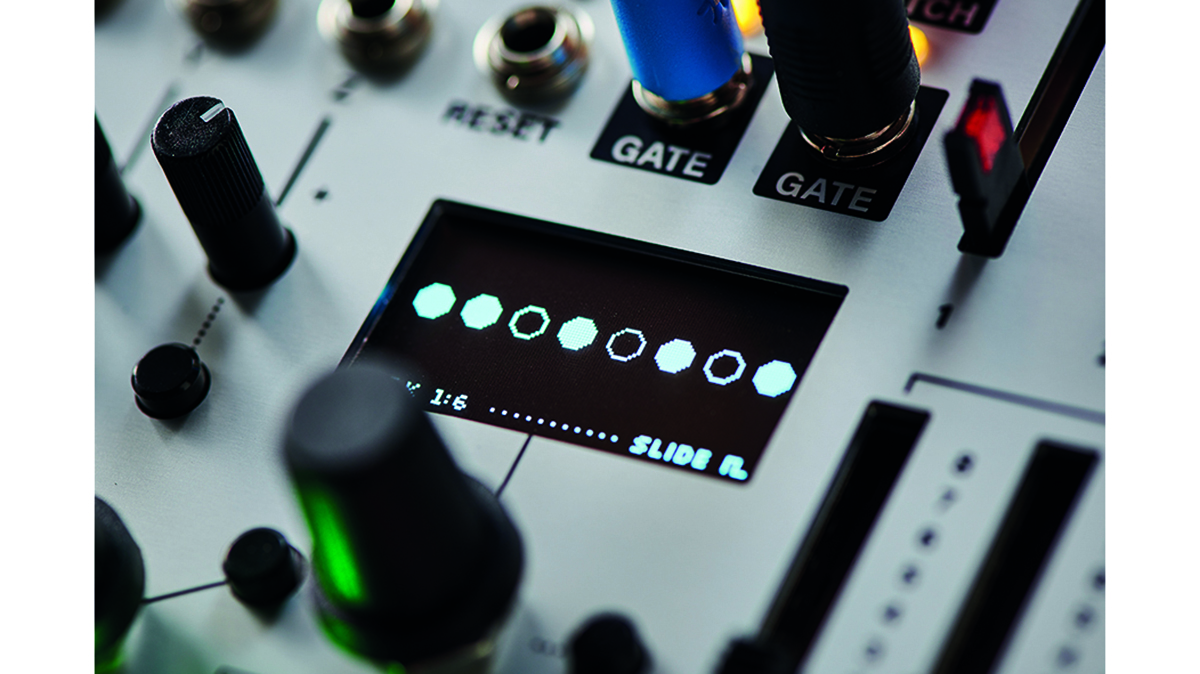
There are more features to discuss than can be covered here, from the wonderful loop button, that essentially acts like a hold on a stage, including mod lanes.
Loopy, despite the name, also turns the eight mod buttons into a form of playable keyboard, when the sequence isn’t running. This is limited but in a good way, as each button only plays the status of that stage. This way you can stay within your melodic parameters but take manual control over the playback. As with the rest of Metropolix this is great for a break and build in live performance.
MusicRadar verdict: Metropolix takes an already excellent idea and expands upon it in many ways, increasing the abilities and fun factor dramatically.
Intellijel Metropolix: The web says
"The successor to the Metropolis is an engaging, hands-on sequencer with impressive performance features."
Juno Daily
"Metropolix stays with the original idea and builds interesting functionality in around it… It’s an infectiously fun sequencer."
Gear News
Intellijel Metropolix: Hands-on demos
Intellijel
Loopop
mylarmelodies
Intellijel Metropolix: Specifications
- Two melodic tracks and one mod track
- More modulation options than you can shake a stick at
- Multiple assignable controls
- OLED screen for key information
- Colour coded illuminated mod switches
- CONTACT: Intellijel
Prince’s Purple Rain follow-up came out of leftfield, but did it derail his career?
GAK is gone: UK music store giant GAK just got bought by Gear4Music for £2.4 million
“It pretty much half killed us. Whether the band would continue was in the balance”: The Radiohead album that almost broke up the band, turned the music industry on its head - and became their best record
